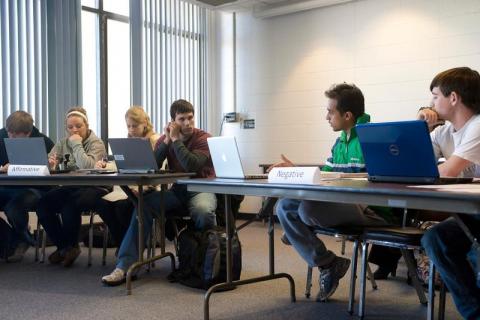
The debates were part of the ethics in organizations course taught by business professor William Wilhelm, which fulfills the recently created ethics and social responsibility category in Foundational Studies.

The debates were part of the ethics in organizations course taught by business professor William Wilhelm, which fulfills the recently created ethics and social responsibility category in Foundational Studies.
As the Occupy Wall Street movement began to spread across the nation, Indiana State professor William Wilhelm probed students in his Ethics in Organizations class about their knowledge of the movement.
Only two hands went up, accompanied by many blank stares, he said.
After realizing how little his students knew about the movement he asked them to research it and come to class prepared to discuss at least one issue influencing the movement and how they felt about it.
When the students shared their research in the next class, Wilhelm observed a marked change in them.
\"It was amazing how engaged the conversations got,\" Wilhelm said. \"It was a really animated discussion.\"
Wilhelm\'s course began last semester as a business course that fulfilled the ethics and social responsibility requirement of Foundational Studies, the general education requirements at ISU.
Wilhelm was asked to design this course because of his background in business ethics, he said, though the course focuses on ethical behavior in all organizations. The wider analysis allows students from all majors to be able to take the course and apply it because they are all going to work in some kind of organization, not necessarily a business, Wilhelm said.
Experiential learning is a key part of the curriculum at Indiana State University and Wilhelm took that into consideration when creating this course.
The course examines the structure of organizations, including ethical theories and current events.
In order to incorporate experiential learning in these areas, Wilhelm planned debates to engage students in critical thinking, researching and developing arguments. The Occupy Wall Street class discussions led to new topics from what Wilhelm had initially planned.
The students debated the legalization of marijuana, drug screening to qualify for welfare and unemployment, taxing the wealthy at a higher rate and reallocating money from the national defense budget to aid social programs.
\"This was the first time I had participated in a debate and it was a challenging learning experience. The greatest challenge was having to analyze my own beliefs and perceptions,\" said Diana Marshall, an ISU junior majoring in accounting.
The classes divided based on their topic of interest and then into teams researching the opposing arguments of each topic.
\"I think that it is important to have activities like this in class because students should be encouraged to form their own ideas and express their creativity,\" said Tricia Hudspeth, a senior marketing major.
The teams consisted of active debaters and researchers who were on their laptops the whole time refining their side\'s arguments, Wilhelm said.
Though her team focused on statistics to create an argument, \"we also realized that those statistics represented real people with needs that could not be ignored,\" Marshall said.
\"The debate clearly forced each of us to apply logic and critical thinking skills as we prepared our arguments for the debate,\" she added. She took the class believing it to be a good fit with her major because of numerous corporate scandals which have heightened attention to ethics, she said.
Engaging in civil disagreement brings people together, said Wilhelm, with Marshall and Hudspeth agreeing that the exercise did not divide the students.
\"Actually, I feel the opposite is true, it seemed to draw us together,\" Marshall said. \"We often believe everyone sees a situation the same way that we do, the debate helped us visualize the opposing viewpoints more clearly.\"
The debate was an experiential learning activity that also got the students very much engaged with the topics and policy debates, Wilhelm said.
\"I got them to read and research some things that they were interested in that were still very relevant to the course and relevant to their lives,\" Wilhelm said. \"We need to have people be engaged in issues dealing with their citizenship and they are now.\"
In order for students to prepare properly, Wilhelm stressed the importance of two words before the debates: civility and logic.
\"Debates are not won by anger and negative rhetoric, we maintain civility,\" Wilhelm told the students. \"The way you are going to win a debate on your topic is going to be based on the strength of your logical arguments and that means research.\"
Students in the class were also required to complete a community engagement project which included investigating and volunteering for eight hours with an organization. The project culminated with a written paper and presentation.
The presentations allowed all students in the class to become more familiar with the different organizations where students chose to invest their time.
Hudspeth thought this project helped students gain a better understanding of the world they live in.
In the reports students also had to identify the needs of the organization and Wilhelm hopes to use this information for a future benefit. The idea is to get business majors involved with providing services to meet these needs through an internship course.
This project will identify if there are needs out there that other students can serve, Wilhelm said.
Photo: http://isuphoto.smugmug.com/Events/WILHELMCLASSROOM-DEBATE/i-RtRnTRn/0/L/11182011WILHELMCLASSROOM001883-L.jpg (ISU/Rachel Keyes)
Students debating during a class taught by ISU professor William Wilhelm. Wilhelm\'s ethics in organizations class debated several topics to engage in critical thinking and as a way to incorporate experiential learning into the curriculum.
Contact: William Wilhelm, professor of business education, information and technology, Scott College of Business, Indiana State University, 812-237-2076 or william.wilhelm@indstate.edu
Writer: Alexa Larkin, media relations assistant, Office of Communications and Marketing, Indiana State University.